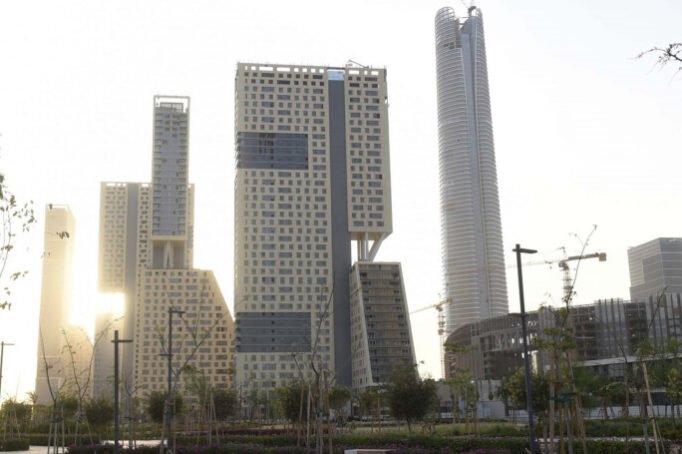H
ave you ever experienced power cuts lasting more than five hours in the middle of a scorching heatwave? This is what Egyptians have been experiencing for the past two weeks and will continue to do so for the next month, according to Prime Minister Mostafa Madbouly. The public, which has endured a heatwave of 40°C or more as well as power cuts, has expressed its growing discontent on various platforms in the hope that government officials will hear their voices.
Meanwhile, the Egyptian government continues to promote and invest in urban megaprojects such as the New Administrative Capital, the Cairo Monorail, and Capital Med. Madbouly recently claimed that these projects are being pursued for the necessary development of the Egyptian economy and were it not for them, the country would have collapsed some time ago.
Similarly, Saudi Arabia has been promoting its latest megacity project in the province of Tabuk known as “The Line.” If you have ever imagined living inside a mirror, The Line promises to make your fantasy come true. It is a 170-kilometer-long linear smart city stretching from west to east, and aims to be the world’s first city powered by renewable energy.
The Line
In his latest effort to promote this project, Saudi Crown Prince Mohammed bin Salman (MBS) has teamed up with the Discovery Channel and produced a documentary titled “The Line: Saudi Arabia’s City of the Future in Neom.”
In the documentary, MBS dismissed critics of his vision, claiming that his futuristic urban megaproject, which is being constructed in an “untouched” area, will go a long way towards meeting the environmental sustainability needs of the population by 2030. He stated, “They say that a lot of the projects that are done in Saudi Arabia cannot be done, that they’re too ambitious. They can keep saying that and we can keep proving them wrong.”
Is it true that they are building The Line in an “untouched” area? According to Courtney Freer, a research fellow at the Middle East Center at the London School of Economics and Political Science, it is not. The Saudi security forces killed Abdul-Rahman Al-Howeiti of the Howeitat tribe in 2020 because he refused to leave his home, which was on the megaproject’s site.
In the same year, his tribe sent an urgent request to the UN for protection against their allegations of the government’s forced displacement. Furthermore, a report in the Wall Street Journal estimated that 20,000 people would be evicted from the area to make way for the city.
When did MENA’s urban megaprojects start?
The history of urban megaprojects in the MENA began in 2008 with the launch of the Masdar City project in the United Arab Emirates. The original plan for Masdar City was to be the first carbon-neutral city in the MENA region, with zero carbon emissions by 2016. However, the city has not lived up to expectations.
Today, Masdar City is failing to live up to the ambitions of its original plan. If anything, it could be described as the “world’s first green ghost town.” Gökçe Günel, an anthropologist and associate professor at Rice University, attributed most of the shortcomings to the project’s publicity, which focused on promoting the city as a carbon-free utopia rather than paying attention to the actual construction.
In addition, the latest official figures show that Masdar City is home to only 6,000 people out of an expected 40,000. This setback hasn’t stopped other countries in the region from investing in the race to create urban megaprojects for “environmental sustainability.”
In 2019, the European Institute of the Mediterranean (IEMed) issued a warning about the serious socio-economic consequences of climate change in the region. The consequences include, among others, further poverty, political instability, and poor governance.
Despite the warnings, certain Arab governments have continued to invest in urban megaprojects. They have promoted their ambitious projects as sustainable, green, and smart in line with their commitments to environmental agreements such as the Paris Agreement.
Utopian vision: Supporters of the urban megaprojects
With the current global environmental crisis, many seem to agree on the need to develop sustainable urban projects as a solution to the crisis. In addition, MENA’s largest cities are suffering from housing problems due to rapidly growing populations. So, it seems only fair that governments would come up with urban projects that can solve both problems.
Taking The Line as an example, Tarek Qaddumi, an executive director from Neom’s urban project, told the magazine Dezeen that the city will combat the negative effects of urban sprawl. Since the city is vertically layered, the structure will limit the expansion of urban areas. The city will also offer technological progress and sustainability as a way of life.
On the business side, many businesspeople believe that these urban projects will boost the economy and attract good investments. Take Mohamed Khaled, a commercial real estate consultant, as an example: he told Egypt Today that the New Capital will be the perfect place for those who want to invest their money in good locations, as it will offer great business opportunities.
The investment of the Talaat Mustafa Group, one of the biggest construction companies in Egypt, is evidence to this end. Reports have indicated that they have invested in the foundations for the “Noor City” project within the New Capital. Similarly, Rawan Ahmed, a Saudi entrepreneur, told the National that it is very exciting to have innovations such as The Line be featured in the kingdom.
In terms of smart sustainability, housing, and business, many believe that MENA’s urban megaprojects offer innovation for a better future.
Dystopian vision: Critics of the urban megaprojects
Many critics from different fields have criticized MENA urban megaprojects as dystopian because of the authoritarian nature of regional political structures, the cost of these projects, and the delusional goals set for them. Starting with the authoritarian nature, experts such as Robert Draper, a correspondent for GQ, claim that the urban megaprojects have clearly proven that governments do not involve their citizens in the decision-making process.
Returning to the Egyptian case, Michele Dunne, a nonresident scholar in Carnegie’s Middle East Program, claimed that the New Capital’s emptiness proves that President Abdel Fattah El-Sisi’s vision doesn’t include most Egyptian citizens: ordinary citizens are not allowed there on the grounds that it is a “military compound.”
Similarly, the Saudi government hasn’t consulted its citizens on whether they would agree to evacuate their homes for the megaproject nor has it offered them adequate compensation. While MBS claims that The Line is being constructed in an “untouched” area to provide housing for the population, the reality tells a different story.
Local population and cost
According to a New York Times report, MBS has never mentioned the tribal community that is forced to leave the project’s site or the consequences they face for not complying. On October 2, 2022, the kingdom’s special courts handed down the death sentence to three members of the Howeitat tribe who protested against the forced eviction of their homes in 2020.
Experts such as Philip Oldfield, head of school at the School of Built Environment, University of New South Wales (UNSW), have also criticized the cost of these plans. Despite governments’ claims that these projects are being implemented to save the region from the ongoing climate and overpopulation crises, Oldfield has warned that the projects are costly for all the wrong reasons. A project like The Line could destroy the biodiversity of the Saudi desert. Would the migrating birds understand what a mirror is?
Furthermore, according to Oldfield, the financial and environmental costs of building the project will overwhelm any promised environmental benefits. He told Dezeen that the project will require a huge amount of steel, glass, and concrete – all of which are not considered low-carbon materials. His findings could also be applied to the Egyptian case.
Recommended
Utopian vision?
Lastly, experts such as Mohamed ElShahed, an architectural historian, have warned the public of the dystopian reality of these megaprojects. Almost all of MENA’s urban megaprojects claim to be sustainable, smart, and green. The promotional videos for each project promise the public a utopian paradise. Yet, the situation on the ground may present a different narrative.
ElShahed has told Vox that he believes the New Capital is not being built for those purposes, but rather to separate the government from the rest of the population. He claims that the urban planning of the city shows that the government is trying to prevent future rebellions: by transferring governmental buildings out of the public’s reach, the public wouldn’t be able to easily take down the regime.
According to ElShahed, the Egyptian New Capital won’t be the next Egyptian utopia, but rather a dystopia. The same could be said for Saudi Arabia, which has been accused of greenwashing its reputation through its projects. Despite claims of building sustainable cities, the Saudi government has yet to deliver on its promises to reduce oil supplies to the sustainable levels included in the United Nations Development Programme (UNDP) strategy.
While major MENA governments continue to invest and advertise their urban megaprojects as sustainable, technological cities, some observers have raised questions about their alignment with the intended utopian vision and their methods of implementation have sparked discussions about their true impact on ordinary citizens.








